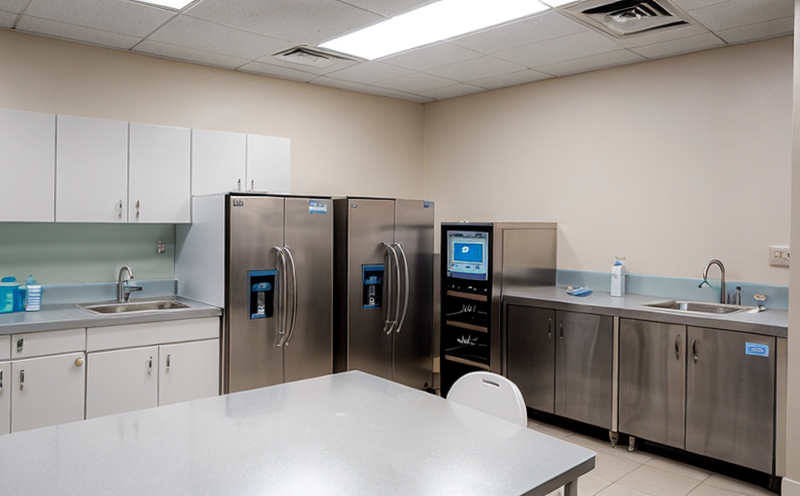Pre-conditioning Temperature Stress Studies
In the realm of medical device testing, ensuring product integrity and performance under various environmental conditions is paramount. Pre-conditioning temperature stress studies are a critical component in this process. These tests involve subjecting devices to high or low temperatures for extended periods before undergoing further validation procedures like sterilization. Such pre-conditioning helps determine whether any changes in the material properties of the device will impact its functionality and sterility.
For instance, when testing a catheter intended for use in cardiovascular procedures, it is essential to verify that the device remains functional after exposure to extreme temperatures. This ensures that during actual clinical use, no deterioration in performance occurs due to thermal stress. The purpose of these studies extends beyond mere endurance; they also help identify potential weaknesses or defects within the design that might not be apparent under standard testing conditions.
The methodology for conducting pre-conditioning temperature stress tests typically involves placing samples in an environmentally controlled chamber where temperatures are adjusted according to predetermined protocols. Commonly used ranges include -40°C up to 125°C, depending on the specific requirements of the device being tested. Specimens are held at these temperatures for durations specified by industry standards or customer specifications.
Once exposed to the desired temperature conditions, devices must be allowed time to reach thermal equilibrium before any further processing takes place. This equilibration period ensures accurate measurement and minimizes errors caused by rapid changes in temperature. After reaching equilibrium, samples are then prepared for subsequent tests such as biological indicators (BI), ethylene oxide sterilization, or other forms of validation.
Instrumentation used during these studies includes climate chambers capable of precise temperature control down to nanokelvin precision and advanced monitoring systems that continuously track environmental parameters. Data collected throughout the experiment is carefully analyzed using statistical methods to ensure compliance with relevant standards such as ISO 11135-2.
When interpreting results from pre-conditioning studies, it’s crucial to consider not only whether there were visible signs of damage but also subtle indicators like increased resistance values in electrical circuits or changes in optical properties. These details could indicate underlying issues that need addressing before proceeding with more rigorous sterilization processes.
- Ensures device functionality under extreme temperature conditions
- Aids in identifying potential design flaws
- Improves overall product quality and reliability
Eurolab Advantages
At Eurolab, our expertise lies in providing comprehensive support across all aspects of medical device testing. With state-of-the-art facilities equipped with the latest technology, we offer unparalleled precision and accuracy when performing pre-conditioning temperature stress studies.
We employ highly skilled personnel who possess extensive knowledge of both theoretical principles and practical applications related to this field. Our team stays updated on all relevant regulatory requirements ensuring that every test conducted meets current standards. Additionally, our commitment to continuous improvement allows us to refine methods based on feedback from clients and advancements in scientific research.
The benefits extend beyond just technical proficiency; we also ensure timely delivery of results while maintaining the highest level of confidentiality regarding proprietary information provided by our clients. By leveraging global networks and resources, Eurolab can provide customized solutions tailored specifically to individual needs whether it be small batch production runs or large scale manufacturing processes.
Quality and Reliability Assurance
- Conducts thorough inspections of equipment and facilities
- Implements stringent quality control measures throughout each stage of testing
- Provides detailed reports documenting all aspects of the study
In the context of medical device manufacturing, ensuring product reliability is paramount. Pre-conditioning temperature stress studies play a vital role in this regard by providing crucial insights into how devices behave under challenging environmental conditions. By incorporating these tests early in the development lifecycle, manufacturers can proactively address any potential issues before they become serious problems.
At Eurolab, we adhere to strict quality and reliability assurance protocols throughout our entire testing process. This includes regular maintenance of our equipment to ensure accurate measurements are obtained consistently. Our team meticulously inspects every aspect of the facility ensuring compliance with international standards such as ISO 17025.
Additionally, we maintain detailed records of all tests conducted which serve as valuable references for future projects. These comprehensive reports provide clients with a clear understanding of what was done during each stage of the study along with recommendations for improvements where necessary. Such transparency fosters trust between us and our customers while helping them make informed decisions about their products.
International Acceptance and Recognition
- Affiliated with leading international organizations like ISO, IEC, and ASTM
- Pioneers in adopting new methodologies based on global best practices
The importance of medical device testing cannot be overstated, especially given the stringent regulations governing this industry. It is crucial that all tests conducted are recognized internationally to ensure consistency across different markets.
Eurolab proudly aligns itself with some of the most respected international organizations in our field including ISO (International Organization for Standardization), IEC (International Electrotechnical Commission), and ASTM International. These affiliations allow us to stay at the forefront of developments within these organizations, ensuring that we incorporate the latest methodologies into our testing procedures.
By doing so, Eurolab not only contributes positively towards advancing standards but also guarantees that all tests performed are accepted universally across various countries and regions worldwide. This widespread acceptance enhances confidence among regulatory authorities and end users alike when it comes to trusting products that have undergone rigorous evaluation according to these globally recognized guidelines.





